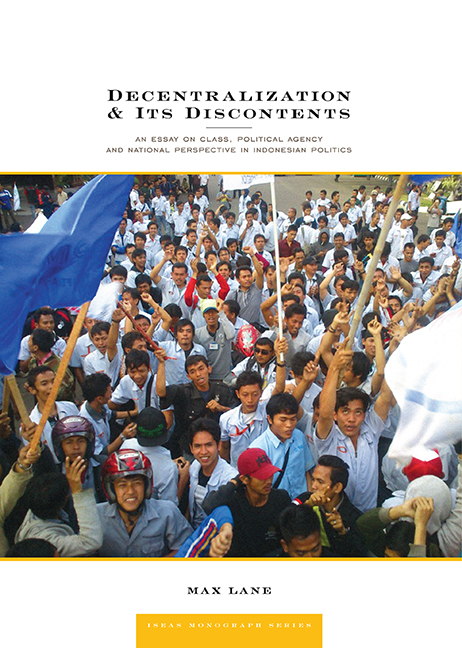 Decentralization and Its Discontents
Decentralization and Its Discontents Book contents
- Frontmatter
- Contents
- Editorial Note
- Preface
- About the Author
- Introduction
- I The Enigmatic Emergence of Decentralization
- II The Political Economy of Desentralisasi
- III Decentralization: Its Discontents
- IV National Agency in a “Co-ordinative State”: The Future of Decentralization
- Conclusion
- Endnotes
- References
- Frontmatter
- Contents
- Editorial Note
- Preface
- About the Author
- Introduction
- I The Enigmatic Emergence of Decentralization
- II The Political Economy of Desentralisasi
- III Decentralization: Its Discontents
- IV National Agency in a “Co-ordinative State”: The Future of Decentralization
- Conclusion
- Endnotes
- References
Summary
Approaches to Understanding Indonesian Politics and Decentralization
It is very possible that the next president of Indonesia will be a former mayor from a modest size Central Javanese city: Joko Widodo, the mayor of Solo from 2005 to 2012. He was elected to the position of Governor of Jakarta in 2012, with 38 per cent of the vote in the first round and 56 per cent of the vote in the second round. His opponent, Fauzi Bowo, was supported by President Yudhoyono and the coalition of ruling parties. Whether Widodo is indeed nominated by the party he joined in 2004, namely the PDI-P (Partai Demokrasi Indonesia – Perjuangan, or Indonesian Democratic Party of Struggle), and then wins or some other scenario evolves, his stakes in the race are high. In September 2013, at a national working conference of the PDI-P, chaired by party head Megawati Sukarnoputri, Widodo emerged as its “star”, with wide media discussion of his presidential prospects.
There is a kind of Jokowimania afoot.
How is it that a local furniture factory owner and local mayor, with no prior political record and no known views on most national issues, can rocket into this position? Has “desentralisasi” created a launching pad for a local politician to launch into national politics? This essay will argue that the rise of Jokowi and desentralisasi are connected, but not as cause and effect. It will argue that both are the results (effects) of other major changes, based in the political economy (the economic-based structure of political power). The essay will identify two major processes of change at work here.
The first of these processes has longer term origins: namely, the quantitative growth of the Indonesian economy as a nonindustrializing capitalist economy under authoritarian rule, resulting in a domestic capitalist class comprising a small number of politically protected big crony capitalists and a huge number of small, local capitalists. The inability to industrialize, due to the lack of any sizeable capital in the hands of either the state or private business at the time of independence in 1945 has, in turn, limited the post-independence capital accumulation, including since 1965. Neither the state nor Indonesian domestic capitalists have been able to develop late twentieth century scale industry anywhere near sufficient to begin to raise Indonesia's average labour productivity or general prosperity.
- Type
- Chapter
- Information
- Decentralization and Its DiscontentsAn Essay on Class, Political Agency and National Perspective in Indonesian Politics, pp. xi - xviiiPublisher: ISEAS–Yusof Ishak InstitutePrint publication year: 2014
